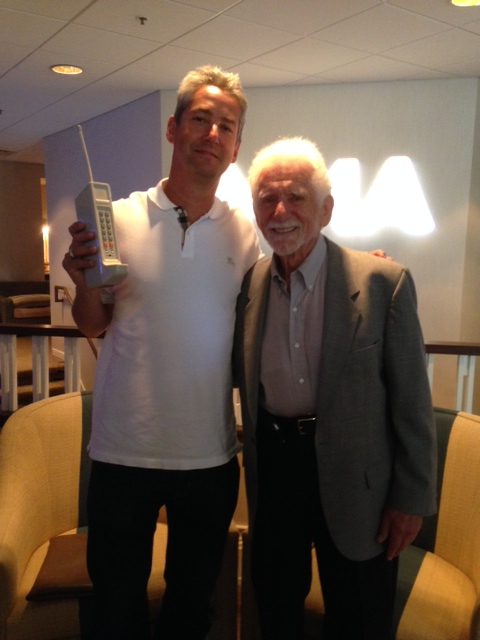We stood in line to a get a picture with the gentleman who looks a bit like Kris Kringle. There was no sitting on his knee, but we fawned over the “toy” that he had with him – the world’s first cellphone that the “father of mobile” had invented.
Forty-one years after Martin Cooper changed everything with a device now warmly called “The Brick” – it was actually the relatively humongous Motorola DynaTAC – the 85-year-old came this week to the Mobile Marketing Association’s CEO/CMO Summit in Hilton Head, S.C. to give us a history lesson – and to tell us what is next.
In 1983, “The Brick” had just 20 minutes of battery life and with a weight of 2 ½ pounds, Cooper said that users couldn’t even hold it up for 20 minutes.
Still, “we jump-started a revolution. People are fundamentally, inherently mobile. It seems like no one is where they want to be. Back then, the phone company told us the only way to do it was to tie people to their desks through copper wire. We set people free.”
That freedom and the consumer behavior changes that have come with it had about 200 marketers, publishers and others spending three days hashing out mobile’s role as a channel. Consensus was absent (for instance, the amount of marketing spend used on mobile was all over the board). Come to think of it, we weren’t wise enough to ask Cooper for his opinion on using his invention for brand building, getting closer to the consumer, and to sell more stuff.
Cooper wasn't reticent when asked whether more “revolutions” are coming.
He cited three areas that will change everything over the next 20 years.
“In health care, instead of curing disease, we should be preventing disease,” Cooper told us. “The annual physical exam is essentially worthless because there is no baseline. Soon we’ll be able to have a physical examination every minute and anticipate a disease before it happen.
“In a few years, we’ll be able to sense a few cancer cells in the body and zap them before the cancer spreads. Every disease will be curable.”
Cooper also predicted what he called a revolution in the educational system through 24/7 learning (“when the brain is challenged, it actually grows”). He named Pong and Pac-Man as early stimulants that preceded activity on tablets, games, Kinect’s, smartphones, and many more.
“The next generation will be smarter than we are. Our only satisfaction is that their children will be smarter than they are.”
Finally, he forecast a “collaborative revolution”, pointing to the ruling change in Egypt energized by Twitter.
“People are doing things in groups like never before,” he said. “We’re more efficient by order of magnitude.
“Some day we will all be rich.”
(article first appeared on imediaconnection.com - http://blogs.imediaconnection.com/blog/2014/07/15/father-of-mobile-predicts-three-more-revolutions/)

